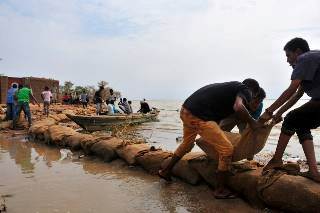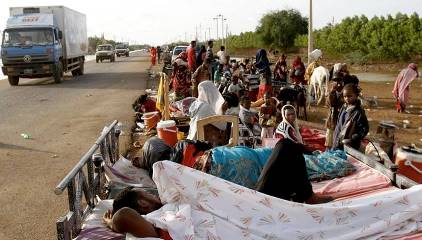Sudan’s Nafeer targeted by government security agents
By Kate McIntosh
August 30, 2013 (KHARTOUM) – There are reports that grassroots flood relief organisation Nafeer has been forced to scale back its operations amid increasing government interference, with claims volunteers have been subject to harassment and intimidation in the field.

According to the statement, Nafeer’s executive committee made the decision in order to carry out an internal audit and to allow survey teams to assess the group’s activities in the field and collect further data on the extent of damage in affected areas.
The committee appealed to all Nafeer coordinators inside and outside Sudan to stop receiving donations for the campaign and send their contributions by the 1 September deadline.
There is speculation the move is linked to an announcement by Khartoum state governor earlier this month requiring all relief agencies to hand over donated goods to be stored and distributed under government supervision.
“Obviously this is something that we cannot and will not accept”, a source close to Nafeer told Sudan Tribune.
The source said that Nafeer was continuing its public health campaigns and any donated items remaining after the inventory would likely be distributed to flood victims in other states, not subject to the same government restrictions as Khartoum.
VOLUNTEERS ARRESTED
The National Intelligence and Security Service (NISS) has dramatically stepped up its presence in flood-affected areas and there have been incidents in which volunteers were either questioned in the field or detained by security agents.
Khartoum resident Ahmed Omer Khalid said he was among seven volunteers, including his 14-year-old son and nephew, arrested by security agents earlier this month while in the field.
Khalid said a team of 14 volunteers had been distributing food and drinking water supplies in the hard-hit Al-Kribab and Al-Shereif areas when the incident occurred.
The 55-year-old father-of six, who runs a family tourism business, said an altercation broke out with security officers after they witnessed his nephew taking photos.
The group was detained and their mobile phones confiscated before being driven to the nearby security office in the Al-Alafoun area.
On their arrival, Khalid said security officers hit the volunteers on their back with sticks as they shouted “welcome, welcome” before making them sit on the ground facing a wall.
During questioning, Khalid said agents accused the volunteers of taking photos to discredit the government in the media, also accusing Nafeer of having links to Christian groups in the country and abroad.
“They (security agents) said we are trying to reflect a bad image of the government and its role. We disagreed with them on all points and we told them our intention is just to help people who really need helping. They are in need of water, they are in need of shelter, about anything you can think of they are need of it and that’s what we are trying to do”, he said.
Khalid said the group was released more than five hours later without charge.
He says he and his two sons continue to volunteer with Nafeer in and around the same area where he was detained.
“You can notice immediately there is a lot of security men, because you can see them gathering in those [flood-affected] areas, even with those people in a very bad situation. I think they are afraid those people will protest against the government”, he said.

Khartoum was particularly hard hit, with an estimated 84,000 people affected by flood waters, which also caused extensive damage to houses and infrastructure.
In some of the worst-affected communities people continue to sleep in dry areas on the side of the road or under trees.
Living conditions are appalling and contaminated drinking water, as well as poor hygiene and sanitation practices are posing an increasing public health risk.
YOUTH MOBILISE
Nafeer was formed after an internal Facebook message from a medical doctor to people in his contact list, asking them to support flood victims.
Word soon spread about the dire situation people were facing and a meeting was held at a youth centre in Amarat, which has now become the bustling headquarters of Nafeer’s campaign.
Nafeer volunteers sprang into action, conducting rapid assessments in affected areas and creating an emergency hotline. It started posting information about its activities on social media sites and the donations began pouring in.
Donation hotlines were also set up by the Sudanese diaspora around the world, including Saudi Arabia, Germany, Canada, the United States and Australia.
Nafeer’s initial core team has now expanded to include some 6,000 registered volunteers. Its English Facebook page has attracted more than 3,600 likes, while its Arabic site has almost 55,000.
Teams of volunteers work around the clock to coordinate logistics, update the group’s social media sites, respond to media requests and man the emergency hotline.
The group has also been sandbagging some of the worst affected areas in Omdurman and Kalakla to keep back the rising Nile waters.
Nafeer has become somewhat of a phenomenon in Sudan, after inspiring an almost unprecedented mobilisation of youth for a common cause.
Every morning, volunteers form a line snaking from Nafeer’s storeroom on the second floor to the street below to load supplies on to waiting trucks before heading out in teams on the back of four-wheel drive vehicles.
“It’s the first time in Sudan to see such a large number of youth volunteering. Also there is a lot of diversity, people of all different backgrounds and ideologies; they are all working together as a team”, said volunteer Mohammad Erwa.
“A large number of Sudanese people have migrated outside Sudan because they feel desperate about their country, but this has injected a positive mentality. It is really inspiring to be a part of that”, he added.
Nafeer clarified on its website on Tuesday that the suspension of donations did not mean the organisation was shutting down its operations, saying it would continue to offer assistance as long there is need in the community.
“Nafeer will continue to respond to any developments, emergencies, or needs related to the floods, whenever and wherever they are needed”, the statement said.
Nafeer said it would release a detailed report on the results of the audit, as well as the campaign’s activities in comparison to the extent of the damage and community needs once accounting and inventory procedures had been completed.
(ST)
